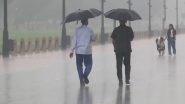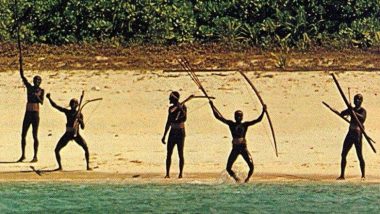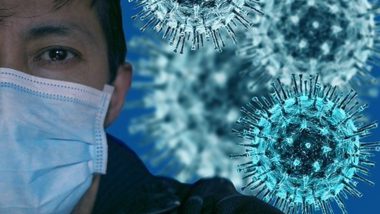Last week, an American missionary John Chau got felled by a rain of arrows as he brazenly attempted to enter North Sentinal Island, home to an isolated tribe Sentinalese known for their violent mistrust of outsiders. They shot Chau down with arrows and are believed to have buried his body in a shallow grave. Rescue operations to retrieve the American’s body was underway, but new reports suggest that they have now been abandoned.
North Sentinel is a part of the Andaman and Nicobar Islands of India, situated on the Bay of Bengal. The Sentinelese are an isolated group who have resisted any kind of contact with the outside world and have maintained their primitive way of life. By apocryphal accounts, it’s believed that the tribe doesn’t know how to build fire. The Indian government, out of respect for the tribesmen’s privacy and the outsider’s safety, prohibits travelling within 3 miles of the island.
But Chau ignored the warnings and bribed two fishermen to ferry him to the forbidden territory. In the end, he paid a heavy price for his foolhardy attitude. The incident sparked many debates about the ethics of the Christian missionary’s action, even if he had a noble cause in his mind.
Chau’s diary entry reads that “it’s worthwhile to declare Jesus to these people” and that the “eternal lives of this tribe is at hand.” But for someone who cared so much about their spiritual lives, Chau had absolute disregard for the tribesmen’s lives. Any contact with an outsider could introduce deadly diseases to the tribes, wiping them out within days.
The Acquired Human Immune System
The human immune system is divided into two categories – the innate immune system and the acquired immune system. The innate immune system works round-the-clock and doesn’t require any preparation to resist an infection.
But the acquired or the adaptive immune system has to be primed to tackle an infection at hand. It helps the immune response grow stronger, based on the memory of each pathogen that attacks it. It relies on B cells and T cells that recognise a bacterium or virus and generates immune responses that are tailored to suit the pathogen. That's why certain diseases like chicken pox don't strike twice.
Immunologist Dr Om Shrivastava, Director, Infectious Diseases at Jaslok Hospital says, “To build a robust immunity, we need small incremental abuses to the immune system.” These abuses will help the immune cells “remember” the pathogen and eliminate it appropriately.
“When you were a child, you were more prone to infections. But as you grow old, beyond the age of 13-14, you would have built a much stronger immune system,” says Dr Shrivastava. Credit goes to the acquired immune system that has been exposed to different pathogens and has “learnt” some skills along its way. John Chau's Killing: 44 Violations by Andaman Visitors in Recent Past; RAP to be Re-imposed on North Sentinel Island.
To facilitate such exposure and to gain immunity over pathogens, socialising is necessary. The more people we meet, the more bugs we are exposed to. And as a result, we gain immunity to many parasites and the infectious diseases and develop a sophisticated immune system that can ward off most pathogens. The same cannot be said about isolated tribes.
How Social Isolation Affects Human Immune System
Tribes like the Sentinelese have lived a secluded life for over 60,000 and had little to no contact with the outside world, which means they aren’t exposed to as many parasites as we are and have an underdeveloped acquired immune system. An isolated group, the members don’t have the immunity to battle diseases like influenza and measles. Meet Madhumala Chattopadhyay, First Indian Anthropologist Woman Who Had a Friendly Encounter With Sentinelese Tribe of Andaman.
When British Naval officer Maurice Vidal Portman who was the colonial administrator to the Andaman and Nicobar Islands tried establishing contact with the natives in 1880, he captured six people – an elderly man and woman and four children – and took them back to Port Blair. The elderly couple died shortly after arriving, possibly from a disease they had no immunity to.
Something similar also happened to the isolated indigenous tribes of Brazil when the government tried to establish contact in the 70s. The missionaries who travelled to the jungles ended up spreading viruses and bacteria, killing several of the tribesmen.
Advocacy group Survival International has alleged that the entry of Chau into the island may have exposed the Sentinelese to new infections too. But how can someone with no outward signs of infection pass on pathogens capable of wiping out the entire tribe?
Dr Shrivastava says that one doesn’t have to be outwardly sick to spread infection: “Even if one doesn’t show any obvious signs, one could still be carrying a bug.” A person alone could decimate a tribe of 50 to 150 people.
Perhaps the tribe’s paranoia of outsiders worked in the favour all these years, guarding them against all the diseases civilisation could carry. With the missionary’s entry into the island, the fate of the 15-member tribe (according to 2011 Indian government census), hangs by a hair strand.
(The above story first appeared on LatestLY on Nov 30, 2018 06:28 PM IST. For more news and updates on politics, world, sports, entertainment and lifestyle, log on to our website latestly.com).













 Quickly
Quickly





















